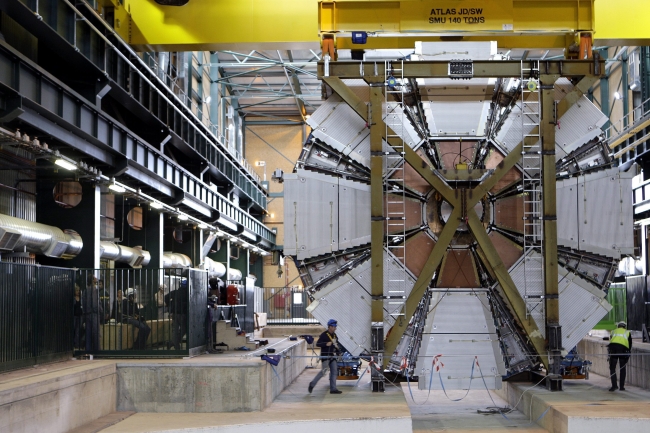Poland's auditing office to monitor 'God particle' scientists in Switzerland
PR dla Zagranicy
Peter Gentle
05.07.2012 10:30
Poland's Supreme Auditing Office is chosen to do external audits of the European Organisation for Nuclear Research in Geneva, where they may have discovered the sub-atomic 'God particle'.

A file photo dated 29 February 2009 showing the last element, weighing 100 tonnes, of the ATLAS (A Toroidal LHC Apparatus) experiment, being lowered into the cave at the European Organization for Nuclear Research CERN (Centre Europeen de Recherche Nucleaire) in Meyrin, near Geneva, Switzerland: photo - EPA/MARTIAL TREZZINI
Poland's state auditing body (NIK) will inspect spending of the research centre (CERN) between the years 2013 and 2015, Polish Radio's IAR news service reports.
This is the first time that CERN's audit will be entrusted to control from one of the EU's new member states and also the first time NIK will inspect an international organization.
Poland's Supreme Audit Office, which usually examines the functioning and spending of state institutions, beat off competition for the role of auditing CERN from similar bodies in Spain, Noway and Switzerland.
The news of NIK's new commission comes in the wake of CERN announcing that scientists have observed a particle that strongly resembles the long-sought after Higgs boson, the final missing ingredient in the standard model of particle physics.
“Standard theory describes the fundamental particles from which we, and everything in the universe, are made, and the forces acting between them,” CERN said in a statement released Wednesday.
“All the matter that we can see, however, appears to be no more than about 4 percent of the total. A more exotic version of the Higgs particle could be a bridge to understanding the 96 percent of the universe that remains obscure," CERN explained.
Standard Physics theory does not explain how it is that some particles gain their mass. The Higgs mechanism, proposed in 1964 by six physicists, could explan the missing link in the theory. If it does it will open up new theory on how the universe was created, say scientists. (pg)